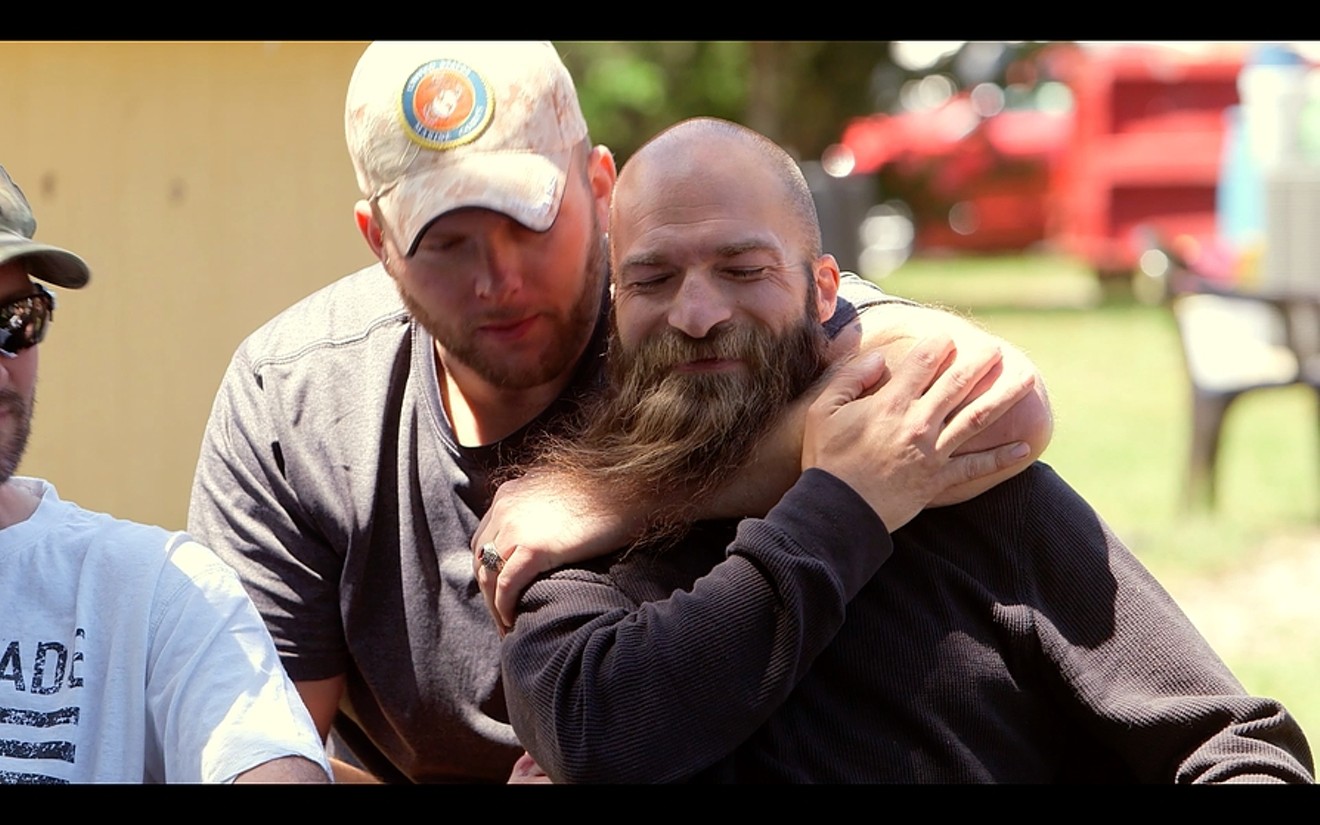One of the primary arguments of the campaign to decriminalize psychedelic mushrooms in Denver was the healing power of the naturally occurring substance. That selling point helped push the measure to victory, as a slim majority of voters approved the initiative. This week, Denver residents will get another chance to hear about the therapeutic potential of psychedelics, in a documentary that is currently touring the country.
From Shock to Awe, which will screen at the Alamo Drafthouse Sloan's Lake on Tuesday, June 18, tracks the journeys of two Colorado veterans as they move from crippling PTSD to healing through the use of psychedelics. The film, which premiered in November 2018, has a particularly powerful arc: The two men, clearly desperate for any chance to ease their mental issues, finally find some peace at the end.
In the beginning of the film, directed by Montreal-based filmmaker Luc Côté, U.S. Army veterans Matt Kahl and Mike Cooley struggle with anxiety, depression and flashbacks from their time in combat overseas. Kahl, who was active in campaigning for the initiative, lives in Divide; Cooley lives in Colorado Springs.
"I buried a part of my soul in Afghanistan, and I'll never get it back. I'll never be that person again," Kahl says in the film.
While cannabis did offer the vets some respite, it didn't give either of them the real help they were seeking. Then came ayahuasca.
Ayahuasca is a traditional psychedelic medicine that has been used for centuries in the Amazon Basin. Liquid from a root and other natural ingredients are mixed; when ingested, ayahuasca can lead to a therapeutic purging of the mind and body. In the movie, Kahl and Cooley drink ayahuasca on camera at a ceremony at a ritual retreat in Orlando. The footage is raw, as the two veterans vomit, cry, laugh and shake. It looks more like an exorcism than a psychedelic ritual.
Kahl and Cooley changed in profound ways after that first ayahuasca retreat, they say. And they've both taken it multiple times since.
"I can’t even recognize the guy that I was in the movie. That feeling of brokenness and loss and hopelessness," says Kahl, who has a wife and two sons. "I have purpose. I’m a new man."
The film also shows how military spouses grapple with the PTSD symptoms of their partners. Cooley's wife, Brooke, is a veteran herself, and uses MDMA-assisted therapy on camera for her own healing. Kahl's wife, Aimee, struggles with seeing her husband suffering in such a deep way. Although the film doesn't show the actual ceremony, it does note that Aimee ended up participating in an ayahuasca ritual months after her husband returned, raving about its potential.
It's ridiculous that the psychedelic substances that helped him and his wife are still criminalized, Cooley says at the end of the film, citing the rate of suicide among veterans, which is far higher than that of the general population, as proof that these medicines should be available.
The Alamo screening starts at 6 p.m. and will be followed by a discussion with the Kahls and the Cooleys. Tickets for the show, which is being presented by GoodCinema, can be purchased here for $20; use the code HEAL for $5 off.
[
{
"name": "Air - MediumRectangle - Inline Content - Mobile Display Size",
"component": "12017618",
"insertPoint": "2",
"requiredCountToDisplay": "2"
},{
"name": "Editor Picks",
"component": "17242653",
"insertPoint": "4",
"requiredCountToDisplay": "1"
},{
"name": "Inline Links",
"component": "18838239",
"insertPoint": "8th",
"startingPoint": 8,
"requiredCountToDisplay": "7",
"maxInsertions": 25
},{
"name": "Air - MediumRectangle - Combo - Inline Content",
"component": "17261320",
"insertPoint": "8th",
"startingPoint": 8,
"requiredCountToDisplay": "7",
"maxInsertions": 25
},{
"name": "Inline Links",
"component": "18838239",
"insertPoint": "8th",
"startingPoint": 12,
"requiredCountToDisplay": "11",
"maxInsertions": 25
},{
"name": "Air - Leaderboard Tower - Combo - Inline Content",
"component": "17261321",
"insertPoint": "8th",
"startingPoint": 12,
"requiredCountToDisplay": "11",
"maxInsertions": 25
}
]












